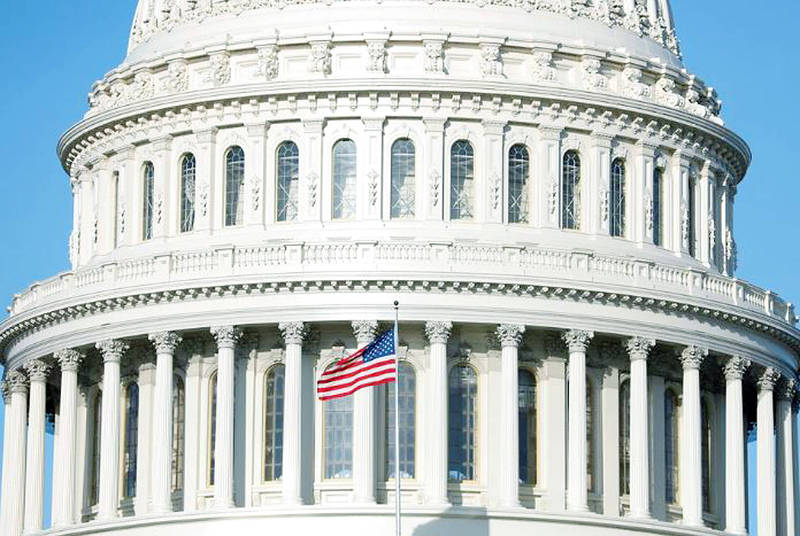《TAIPEI TIMES》 US bill calls for Taiwan military plan

The US national flag flies at the US Capitol on Capitol Hill in Washington on March 18, 2020. Photo: Reuters
BOOSTING COOPERATION: The bill passed by a Senate committee says the US should launch a program to assist Taiwan’s armed forces and engage on military cybersecurity
By Wu Su-wei and Jonathan Chin / Staff reporter, with staff writer and CNA
The US Senate Committee on Armed Services on Friday passed a bill on the national defense policy and budget for the next fiscal year that includes provisions calling for military cooperation with Taiwan.
The US$886.3 billion budgeted under the National Defense Authorization Act (NDAA) was approved 24-1 by the committee, and has been sent to the Senate for approval.
An executive summary provided by the committee states that the US would seek to strengthen its posture in the Indo-Pacific region, in view of “long-term strategic competition with China and Russia.”
Part of that effort includes the US establishing “a comprehensive training, advising, and institutional capacity-building program for the military forces of Taiwan,” the bill states.
It also calls for “engagement with appropriate officials of Taiwan for the purpose of expanding cooperation on military cybersecurity activities.”
The passage of the bill by the committee followed a similar pattern to corresponding legislation in the US House of Representatives, which was passed by the House Armed Services Committee 58-1 on Thursday.
According to the proposal, known as the “Chairman’s Mark,” put forth on June 12 by House Armed Services Committee Chairman Mike Rogers, the House version of the bill encourages joint military exercises between Taiwan and the US, as well as exchanges among officials on both sides.
The bill also urges the US government to support Taiwan in acquiring defense articles and services “through foreign military sales, direct commercial sales, and industrial cooperation” to help build up its asymmetric capabilities.
The bill awaits approval by the House.
Once the Senate and House approve their versions of the NDAA, they must negotiate a final bill that each body has to pass before it can be signed into law by the president.
In Taipei, Institute for National Defense and Security Research analyst Shu Hsiao-huang (舒孝煌) yesterday said that the US Congress is sending a clear signal to the White House that the US must broaden its defense cooperation with Taiwan, including joint exercises to improve interoperability.
The Pentagon has repeatedly underscored interoperability of command and control as a key capability that the US and allied forces must obtain in joint exercises, he said, adding that this would significantly augment the combat performance of a military coalition.
The US conducts joint exercises with South Korea, Japan, the Philippines and Indonesia, which comprise the entirety of the first island chain minus Taiwan, leaving a gap in capabilities, he said.
Current military exercises carried out by Taiwan and the US do not qualify as true joint exercises, he said.
Taiwan-US defense cooperation is conducted too sporadically and does not include senior commanders, which means the methods of waging modern war on a large scale and fresh ideas from the US cannot be learned, Shu said.
新聞來源:TAIPEI TIMES



















